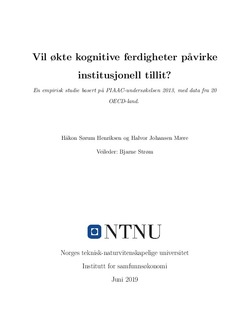Vil økte kognitive ferdigheter påvirke institusjonell tillit?
Master thesis
Permanent lenke
http://hdl.handle.net/11250/2612760Utgivelsesdato
2019Metadata
Vis full innførselSamlinger
Sammendrag
Institusjonell tillit er viktig for et lands økonomiske tilstand. I oppgaven undersøker vi hvordan humankapital påvirker institusjonell tillit og om en eventuell effekt påvirkes av visse landkarakteristika. I litteraturen brukes ofte formell utdanning som mål på humankapital. Bruken av formell utdanning kan føre til noen utfordringer, og vi benytter derfor kognitive ferdigheter som mål på humankapital. Datamaterialet er basert på PIAAC-undersøkelsen, som har som mål å kartlegge den voksene befolknings kognitive ferdigheter. Analysene gjennomføres ved hjelp av minste kvadraters metode, instrumentvariabelmetoden og en ordered probit modell. Ved hjelp av minste kvadraters metode finner vi at en standardavviks økning i kognitive ferdigheter øker institusjonell tillit med 0.145 enheter, på en skala som går fra 1 til 5. Dette resultatet er signifikant til alle nivåer. Resultatet underbygges av analyser gjort ved hjelp av instrumentvariabelmetoden og en ordered probit-modell. Dermed kan vi si at kognitive ferdigheter har en positiv effekt på institusjonell tillit. Effekten varierer imidlertid noe med visse landkarakteristika. Korrupsjon og om et land tidligere har hatt kommuniststyre påvirker effekten negativt, mens om et land er monarki påvirker effekten positivt. Inntektsulikhet og om et land har katolisisme som mest praktiserte religion har ingen signifikant påvirkning på effekten. Institutional trust is an important factor for the economical state of a country. This thesis investigates how human capital affects institutional trust and how the effect is influenced by some country specific characteristics. Formal education and school attainment are in the literature used as a measure of human capital. However, this measure might create some challenges so we will therefore apply cognitive skills as a measure of human capital. The PIAAC-survey, which goal is to measure cognitive skills among adults, is our main source of data. The analyses is conducted using OLS, 2SLS and an ordered probit model. From the model estimated using OLS, we find that a standard deviation increase of cognitive skills leads to an increase in institutional trust of 0.145, on a scale from 1 to 5. This result is significant to all levels and is supported by estimations done using 2SLS and an ordered probit model. Therefore, we can conclude that cognitive skills have a positive effect on institutional trust. However, this effect is influenced by some country specific characteristics. Corruption and if a country is a former communist state, influences the affect negatively. If a country is a monarchy, this will have a positive influence on the effect of cognitive skills on institutional trust. Income inequality and if a country has Catholicism as the main religion has no significant influence.
